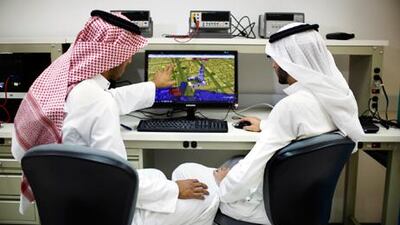On the top floor of a small office building nestled in the heart of Saudi Arabia's capital Riyadh lies what some industry experts believe could be the future of telecommunications research in the Middle East.
Last month, the ribbon was cut at the Centre of Excellence for Wireless Applications (CEWA), a telecoms research and development (R&D) facility that was founded in partnership with the King Abdulaziz City for Science and Technology (KACST)and Intel, the microchip giant. As dignitaries, university representatives and Intel executives toured the facility, there was a growing sense that CEWA could mark a turning point in the local development of telecoms technology that could be manufactured around the world.
For a country that has more wireless users than fixed-line broadband connections, the implications could be significant. "We expect this centre to study broadband issues and research that will enhance our abilities and later filter down to the regular man on the street," says Mohammed ibn Ibrahim al Suwaiyel, the president of KACST. There is a noticeable lack of technology research and development facilities based in the Middle East. This past year, Google highlighted the dearth of patents filed across the region in contrast to Europe or the US.
Efforts have been made in recent years to rectify this situation through government and industry partnerships. The CEWA facility is the latest and perhaps the most ambitious effort to build a world-class research base in Saudi Arabia. Filled with laboratories, computer modelling stations, experienced engineers from abroad, cutting-edge equipment and significant funding, CEWA is a telecoms researcher's dream come true.
"We went out to the industry and asked them what would they want to see in an R&D centre, what problems would they like to solve," says Fadah al Hussein, the chief executive of CEWA. "We got their feedback and structured our facility to reflect their demands. This is now catered to what operators need but is focused on producing something that is tangible." Already, operators such as Mobily and STC as well as telecoms equipment makers such as Huawei have expressed interest in contributing engineers and resources to CEWA.
Several research projects have also been completed, including one specific to the region. During the Haj pilgrimage last year, CEWA researchers outfitted authorities with laptops that could read special cards carried by pilgrims that contained all their medical information. Following a successful pilot project, CEWA is negotiating with Haj authorities in Mecca to fully deploy the technology in an upcoming pilgrimage next year.
"There's so many different languages and cultures that come to Haj and this would make it easier for authorities to handle an emergency situation if they can't communicate with them," says Hani Elgebaly, the managing director of Intel's Middle East wireless communications lab. "This is a real example of something we're developing that can be applied to a local problem. We're hoping that we can work on more projects like this that would apply to our part of the world and maybe export them later."
Other projects in the works include testing fourth-generation wireless technology performance in situations particular to the region, including during sandstorms, in extreme temperatures or in very high density crowds, such as during Haj. This is not Intel's first foray into improving R&D in the Middle East. The company has donated 21 technology labs throughout the region, including one at Abu Dhabi's Khalifa University of Science, Technology and Research, and has trained 5,000 technology students and professors.
Intel Capital, the company's venture capital arm, has also led the charge in seeding technology start-ups in the region and has funded seven companies, from Lebanon, Jordan and the UAE. While wireless technologies do not necessarily fall into Intel's core business of microchip manufacturing, it expects its efforts to holistically help its business in the long term, says Tom Kilroy, Intel's senior vice president and general manager of sales and marketing.
"We basically want to help improve the amount of broadband connections in the Middle East, which in turn, helps us sell more PCs," Mr Kilroy says. "It's a journey but to some degree this is a start of what can really transform not just the kingdom but the Arab world as well." Said Irfan, atelecoms research manager based in Dubai for IDC Middle East, Turkey and Africa, said the development of the CEWA facility would benefit the region's research efforts.
"For Intel, this falls in line with some recent moves to strengthen their base in the wireless sector," Mr Irfan said. "This partnership could potentially give them a good platform to boost their positioning with clients, especially in a region where the pace of wireless growth is phenomenal." dgeorgecosh@thenational.ae

